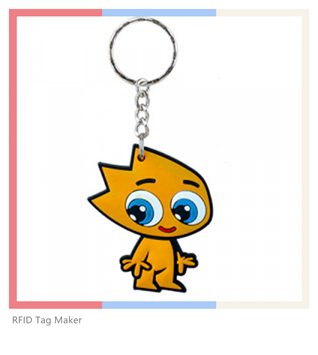The silicone RFID keychain is a type of keychain that has a silicone casing and an RFID chip inside. RFID stands for radio frequency identification, which is a technology that uses electromagnetic fields to identify and track objects. A silicone RFID keychain can be used for various purposes, such as access control, payment, identification, tracking, etc.
RFID technology can be divided into different frequency bands, such as low frequency (LF), high frequency (HF), ultra-high frequency (UHF), and microwave. Each frequency band has its own advantages and disadvantages in terms of reading range, data transfer rate, interference resistance, and cost. The most common frequency band for silicone RFID keychains is HF, which operates at 13.56 MHz and conforms to the NFC (near field communication) standard. NFC is a subset of RFID that allows two devices to communicate within a short distance (usually less than 10 cm).
Silicone RFID keychains are usually passive, which means they do not have a battery and rely on the reader to provide power and data exchange. The reader sends out radio waves that activate the RFID chip in the keychain, and then reads or writes data to it. The data stored in the RFID chip can be a unique serial number, or more complex information such as personal details, access rights, payment records, etc.
Silicone RFID keychains have many advantages over traditional keychains. They are:
– Durable: Silicone is a flexible and resilient material that can withstand water, dust, heat, cold, and shock. It also provides a comfortable grip and a smooth surface for printing logos or designs.
– Secure: RFID technology offers a high level of security and encryption to prevent unauthorized access or cloning of the keychain. Some RFID chips also have anti-collision features that allow multiple keychains to be read simultaneously without interference.
– Convenient: Silicone RFID keychains do not require physical contact or line of sight to be read by the reader. They can be scanned quickly and easily by simply holding them near the reader. They can also store more data than traditional keychains and support multiple applications on one device.
Silicone RFID keychains have many applications in various fields and industries. Some examples are:
– Access control: Silicone RFID keychains can be used to grant or deny access to buildings, rooms, parking lots, elevators, etc. They can also record the time and location of each entry or exit for attendance or security purposes.
– Payment: Silicone RFID keychains can be used to make contactless payments at stores, vending machines, public transport, etc. They can also store loyalty points or coupons for discounts or rewards.
– Identification: Silicone RFID keychains can be used to identify individuals or groups for personalization or verification. They can also store personal information such as name, address, phone number, medical history, etc.
– Tracking: Silicone RFID keychains can be used to track the location or movement of objects or people for inventory management, asset protection, logistics optimization, etc.
In conclusion, silicone RFID keychains are smart devices that use RFID technology to store and transmit data wirelessly. They are made of silicone material that is durable, secure, convenient, and customizable. They have many applications in various fields and industries that enhance efficiency, convenience, and security.
Personalization:
– Silk-screen printing with logo
– Laser Engraved Number
– Ink jet printed serial number
– Chip encoding
– Rings or thread is optional
Chip Available:
– 125KHz 18000-part2: EM4200, TK4100, etc.
– 125KHz ISO11784/785: T5577, EM4305, Hitag1, Hitag2, Hitag S256, etc.
– 13.56Mhz ISO15693: ICODE SLI, Tag-it 2048, etc.
– 13.56Mhz ISO18082: NTAG210, NTAG212, NTAG213, NTAG215, NTAG216, Topaz512, etc.
– 13.56Mhz ISO14443A: MIFARE Classic ®, MIFARE Ultralight®, MIFARE®DESFire®EV1, MIFARE Plus®, etc.
– 860Mhz-960Mhz ISO/IEC 18000-6C: UCODE, MONZA, HIGGS, etc.




